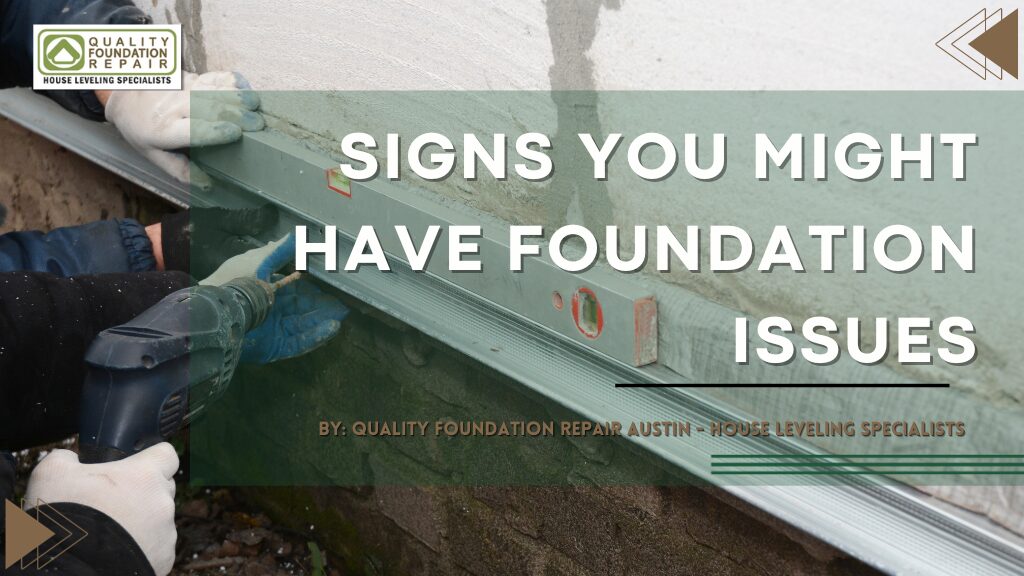
- Common Signs of Foundation Problems
- 1. Large Diagonal Cracks in Foundation Walls (Exterior Walls)
- 2. Sticking Doors That Won't Latch
- 3. Cracks in Wood Floors or Floor Tiles
- 4. Cracking in Interior Walls
- 5. Sinking or Uneven Floors
- 6. Sticking or Pulling Away from Window Frames
- 7. Popped Nails (from Drywall)
- 8. Bouncing Floors
- 9. Issues with Drainage Systems
- 10. Walls That Pull Away or Bow
- 11. Moisture Buildup Signs
- Ways to Prevent Foundation Problems
- When to Contact a Foundation Repair Contractor
- FAQs About Foundation Issues
Foundation issues often come with various warning signs, which can help you realize there’s a concern. It’s usually better to identify them as early as possible and have them fixed to reduce your foundation repair costs. This will also ensure you avoid severe damage to your home.
Overall, this guide will help you understand the most common signs of foundation problems, how they’re caused, and what you can do to avoid issues. Let’s dive in!
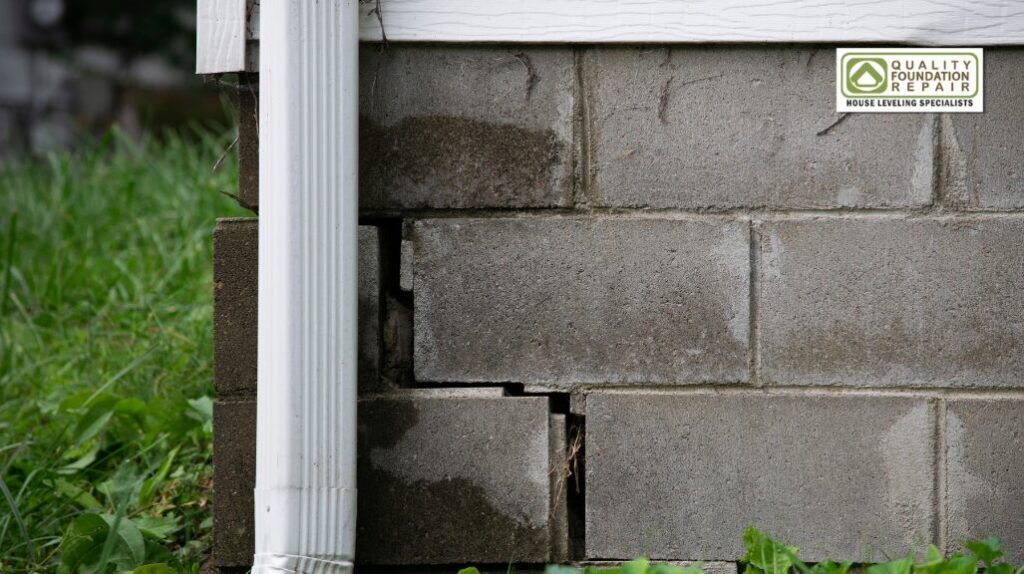
Common Signs of Foundation Problems
Do you have a shifting foundation or fear foundation failure? Here are a few telltale signs that something is wrong and needs to be addressed by a professional:
1. Large Diagonal Cracks in Foundation Walls (Exterior Walls)
Hairline cracks on exterior walls are pretty standard, and there’s usually nothing to fear from them. They show that the property has been dealing with minor and typical settlements and isn’t considered to have foundation issues. Most properties will experience foundation settlement during their lifetimes.
However, foundation cracks above the garage door or anywhere else could be problematic if they meet the criteria listed below:
- They zigzag.
- They’re 1/4-inch wide or more.
- They’re horizontal.
- They let in moisture.
- They continue to lengthen or widen.
Large cracks in an exterior wall indicate foundation issues. If the crack continues to grow or you notice insects and water getting into the home, you will likely require a repair. Likewise, horizontal cracks could lead to severe structural damage, putting you and your house at risk.
2. Sticking Doors That Won’t Latch
Interior doors that don’t close correctly or always stick are a telltale sign of foundation damage. The door frames rely on the foundation to be even for support. Likewise, doors might seem uneven, so one side appears higher than the other. If you use French doors, they don’t adequately meet in the middle and might not latch or close correctly.
Overall, interior doors will usually swell up in the summer because of humidity and heat. However, if you notice it happening year-round or it’s clear the door shifted, you could have a foundation problem that requires professional help.
3. Cracks in Wood Floors or Floor Tiles
Cracking porcelain or ceramic floor tiles are early indications of foundation problems. The floor tiles are cracking because there’s uneven pressure put on them by the shifting foundation. Though one floor tile might crack because you dropped something heavy, multiple cracking tiles indicate you should call a foundation repair company to check for issues.
If you’ve got wood floors, check for gaps between your planks that grow in time. You may also notice sinking sections of your flooring. Bowing and uneven sections might indicate that the floor joists lost support from your foundation or that you have moisture issues from foundation damage that warped the wood.
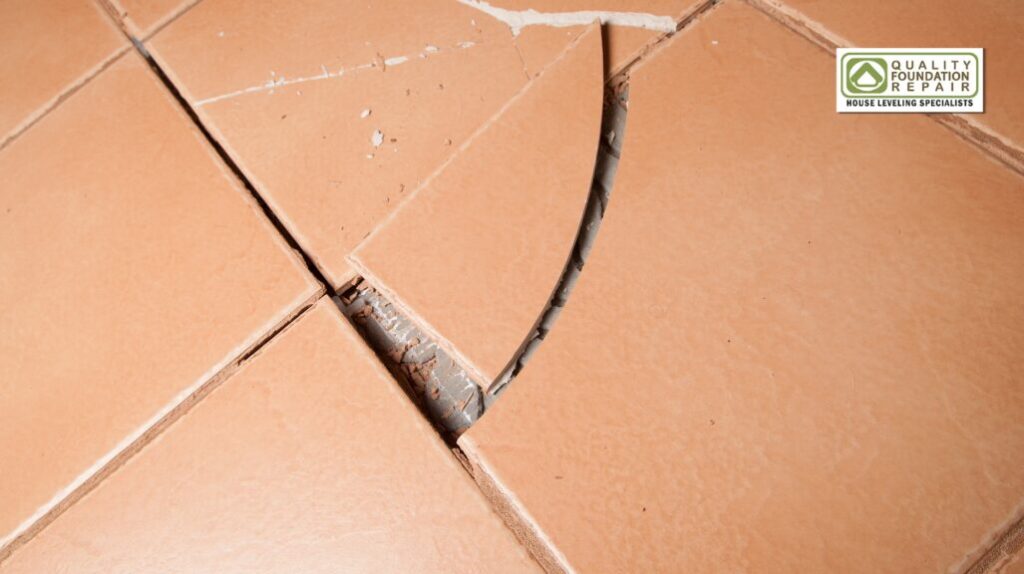
4. Cracking in Interior Walls
As with foundation wall cracks, drywall will naturally crack in time, especially if you experience extreme temperature fluctuations. They’re ubiquitous, with open floor plans and large openings in the interior walls.
However, drywall could crack if the framing shifts due to foundation damage. Drywall cracks might also be a sign of a more significant problem with the foundation if:
- They continue lengthening or widening after the house foundation settles.
- They form in the corners of doors and windows.
- They appear suddenly after settlement.
5. Sinking or Uneven Floors
Check the outside of your property from far away. If you’re experiencing a settling foundation or sinkage around the home base, you might notice that your roofline isn’t straight or even.
Typically, a sinking foundation means a severe issue, so you might also experience sagging floors in the home. You may notice that one side of the house is lower than the other. Those with brick on the outside often see step cracks traveling toward the roofline.
6. Sticking or Pulling Away from Window Frames
When you have foundation problems, the windows in your home could begin sticking as you open or close them. Likewise, they might not fully latch because there is more pressure on the walls, which makes them bulge or shift slightly. In some cases, the window frames pull away from the brick.
7. Popped Nails (from Drywall)
You might not think that nails popping out of the drywall is a big deal, and it might not be if it happens occasionally. However, if you notice it regularly and in various areas of the home, it could be a sign that your house is under increased pressure, stress, or shifting.
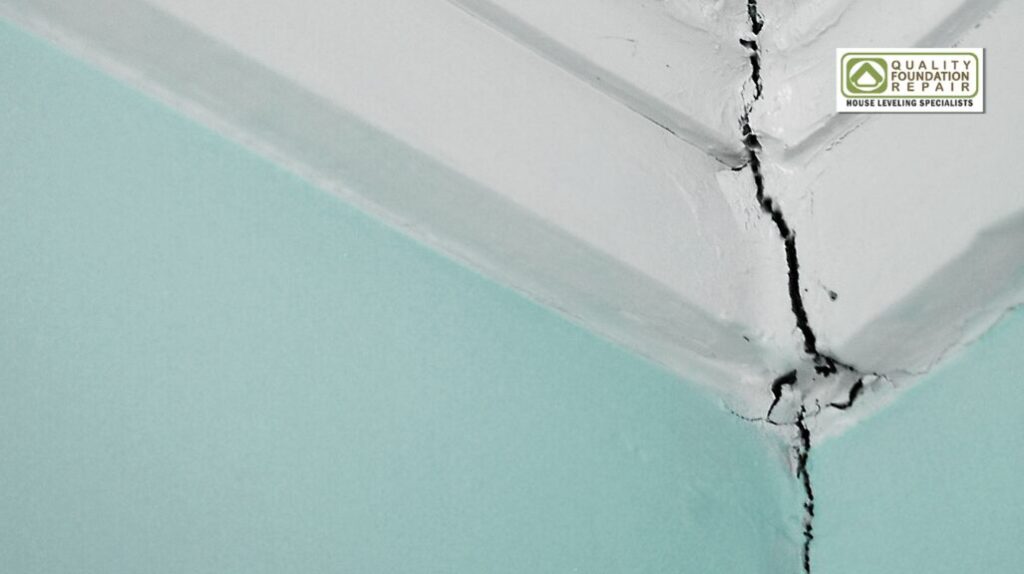
8. Bouncing Floors
One of the biggest signs of foundation issues is spongy or bouncy floors. There can be numerous reasons for this, but you might need to hire a structural engineer if you notice it in your new property or suddenly find this issue accompanied by creaking and popping.
A professional can determine if foundation problems cause your bouncing floors. Sometimes, you only need a few more braces under the floorboards to fix the issue.
9. Issues with Drainage Systems
Runoff water could be causing your foundation problems. Therefore, checking the drainage before it leads to other signs of foundation issues is crucial.
Assess the property after a good rainfall to see how the ground will drain the water. If you notice pooling, you might have drainage issues, leading to significant problems in the crawl space and foundation.
Likewise, it would be best to go into the crawl space or basement after heavy rain to check for significant moisture in the air. You may also spot visible signs of leaking in the cracks. If your air feels heavier than it ever did or you notice wet concrete, you might require a new foundation drainage system.
10. Walls That Pull Away or Bow
Do you think the walls or outside of your home are bowing outward when you look at it? This is a strong indication that you have foundation problems. Likewise, you might notice that the countertops or kitchen cabinets have separated from the walls. This could mean shifting along the foundation.
To test this for yourself, use a straight edge to check your basement walls and the walls on the main level. Minor bowing can be caused by normal settlement, but it’s wise to call a specialist immediately to confirm the root cause.
11. Moisture Buildup Signs
Moisture in the basement or crawl space could mean foundation damage. If you think you have excess moisture, it’s wise to check in the under-home area for these things:
- Musty odors
- Mold growth
- Heavy air
- Pest infestations
- Plumbing leaks
- Efflorescence (a white and flaky substance on your concrete)
If moisture accumulates under the home, it might affect the air quality of your living space. Humidity from a leaky foundation can lead to indoor temperatures that feel hotter in summer and colder in winter. Homeowners often change the temperature to compensate, so you might be able to spot a foundation issue if you notice an increase in your energy consumption.
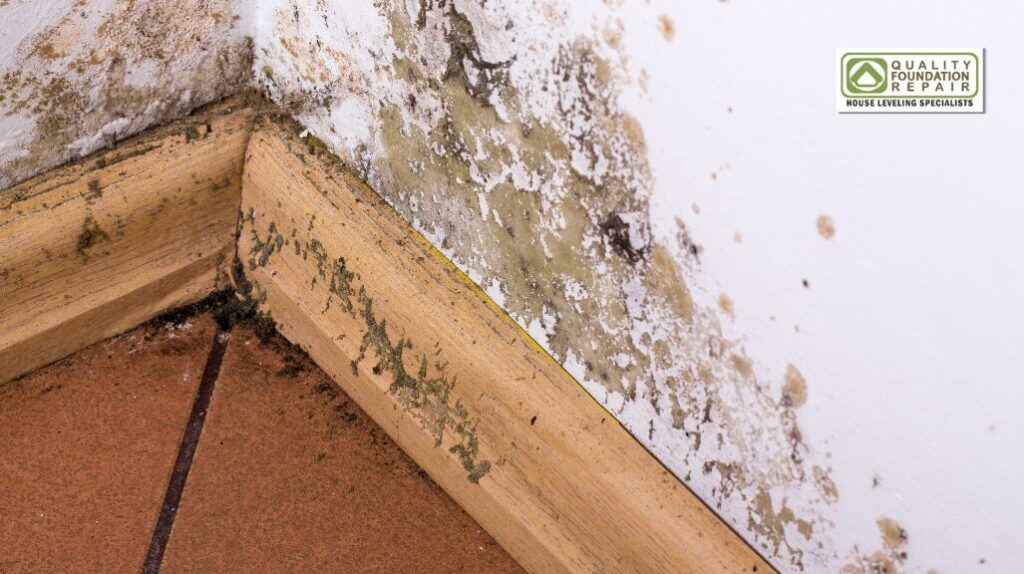
Ways to Prevent Foundation Problems
It’s wise to identify foundation problems as soon as possible to keep foundation repair costs low and reduce the structural damage to your house. However, prevention is the best solution.
Here are a few things to consider to avoid foundation issues and prevent damage:
1. Grade the Soil-Away from the Home’s Foundation
One simple way to avoid foundation problems is to grade the soil away from the foundation. Roughly 6 inches over 10 feet slope can keep runoff away from the foundation. Likewise, you will reduce the risk of hydrostatic pressure from expanding soil and water intrusion.
2. Consider a Gutter System
Installing gutters, gutter extenders, and leaders is also affordable and will reroute any extra moisture from the roof away from the foundation. Just ensure your new system moves water safely away from the concrete. In some cases, this alone is enough to avoid any issues.
3. Keep Shrubbery Away from the Home’s Foundation
The roots of shrubs, bushes, and trees will hold water around them. If those roots are close to the foundation, the soil could expand, which means the runoff could go into the foundation cracks or concrete. Ensure trees are 10 feet away and shrubs about 5 feet from the house.
4. Address Foundation Issues Early
Inspecting the foundation every six months from the inside and outside and checking for signs of foundation problems is important. When you spot them, consider a foundation repair immediately to prevent them from worsening over time.
5. Install a Proper Drainage System
You might consider a French drain or some other type of foundation drainage system if you know the area sees plenty of rain or if your property has expansive clay soil. A drainage system will move the runoff away from your concrete, often preventing moisture issues completely. This will prevent you from requiring a foundation repair later.
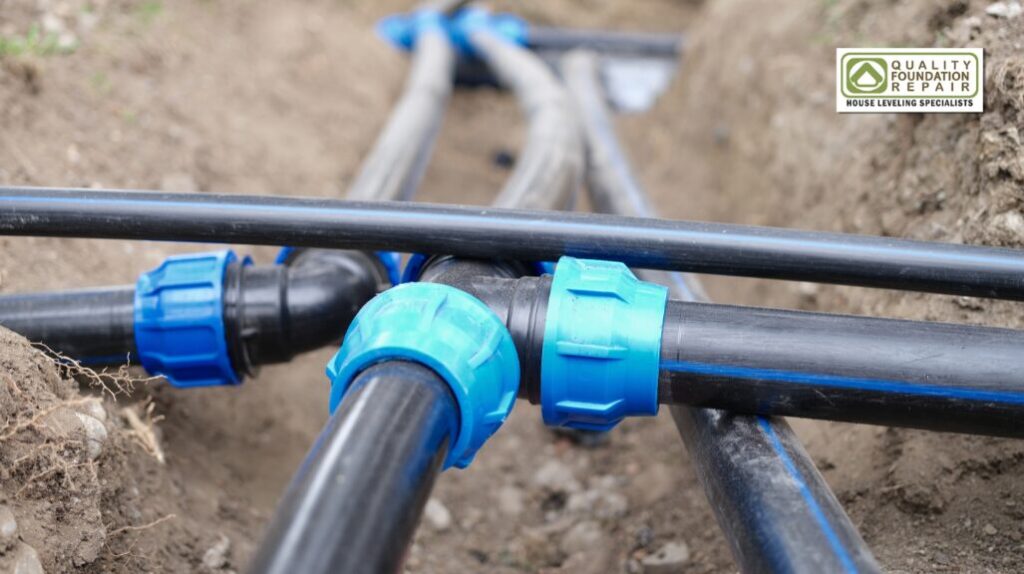
When to Contact a Foundation Repair Contractor
Your home’s foundation supports the whole house, so it’s one of the most critical components. It’s always wise to do foundation repairs as soon as possible when you need them.
Though there are some fun DIY projects you can tackle yourself, foundation repair isn’t one of them. It’s always best to call a professional when you spot signs of foundation problems.
If you notice hairline cracks in the foundation, watch them closely. Those that don’t grow wider or longer over time can be sealed with epoxy or foundation crack sealer. You can do this yourself in many cases, but it might be wise to call a professional to ensure it’s done correctly.
However, if you notice uneven cracks or those over 1/4-inch wide, it’s time to call an expert to get them fixed.
Whether you’re dealing with small cracks, which happen with foundation settling, or something that seems worse, your best bet is to call a professional.
Quality Foundation Repair is here to help you! Dial (512) 363-7769 for your free estimate today. We can check things out and advise you on the best solution to fix the problem and avoid future issues.
FAQs About Foundation Issues
What Is Considered a Major Foundation Issue?
Major foundation issues can include:
Large cracks in the floors and walls
Sinking/settling foundations
Bulging walls
Calling a foundation professional immediately to get the situation checked out is best.
What Are the Signs of Foundation Problems?
There are many signs of foundation problems, which you learned about earlier. These include:
Doors that stick or don’t latch
Wall cracks (interior and exterior)
Cracks in the flooring
Windows that stick or pull away
Bouncy floors
Sinking or uneven structures
Nails that pop out of drywall
Walls that bow or pull away
Drainage issues
Moisture problems
What Are the Problems of the Foundation?
You will likely know if you have a foundation problem and may notice these issues:
A leaning chimney
Sloping floors
Foundation gaps
Crumbling foundations
Step cracks
Is It Safe to Live in a House with Foundation Problems?
In most cases, it’s safe to live in your house, even with a foundation problem. However, you’ll want to fix it immediately to prevent more damage. If you don’t, you may notice the structural integrity gets worse, which means you may have to move until the issue is repaired.



